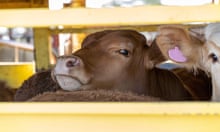An animal welfare organisation has lost a high court challenge over allegations the government “secretly” abandoned a ban on testing cosmetic product ingredients on animals.
Cruelty Free International (CFI) brought legal action against the Home Office, accusing it of leaving the public “in blissful ignorance” that the department’s longstanding policy apparently changed after February 2019.
It claimed ministers were “willing to grant licences for animal testing of cosmetic ingredients” and the “weakening” of a policy ban first announced in 1998 “cannot be lawful”.
The Home Office, which oversees animal experimentation regulation in Great Britain, rejected the CFI’s case as “plainly wrong”, arguing it had not acted unlawfully.
In a ruling on Friday, Mr Justice Linden dismissed the organisation’s challenge. The judge said it was “regrettable” the government did not publicly announce a change in policy and accepted it was a “matter of concern” that “inaccurate” operational guidance was available on the internet.
But he said overall there were no breaches of legal duties by the Home Office and neither the CFI nor the public had a “legitimate expectation” to be informed about a change in policy position.
Much of the legal dispute centred on the CFI’s claim the Home Office had an “erroneous legal understanding” of EU legislation relating to cosmetics and their safety.
Linden said cosmetics regulations, which aim to protect the safety of consumers, ban the testing of cosmetics and ingredients for cosmetics on animals. The marketing of products or ingredients tested on animals was also banned, the judge added in his ruling, which followed a two-day hearing in January.
But separate rules covering the evaluation of chemicals, including some used in cosmetics, were “more permissive” and concerned with the safety of substances from a broader human and environmental context, the judge said. These allow for the testing of substances on animals but only as a “last resort” and to meet the requirements of the regulations, such as the need to assess risks to manufacturing workers.
The Home Office’s policy was that animal testing was lawful in the UK and not in conflict with bans in “limited circumstances” when there were “no other alternative ways” to meet the requirements of the chemical-related regulations, the court was told.
Linden concluded the government had modified its policy for “pragmatic reasons” rather than any legal requirement, but said it was “perfectly coherent to take the view that the two legislative regimes can be read compatibly with each other”.
The judge said the government accepted its change in position “was not fully documented or widely communicated at the time”.
It was “plausible” the Home Office did not publicise the change because it would be politically unpopular to be potentially seen to be watering down the legislation. But the judge said there was no breach of a public law duty to notify CFI or the public, saying it had been “neither unfair nor irrational” to hold meetings with licence holders without consulting CFI.
“I do not see anything in the evidence, whether ‘concrete’ or otherwise, which gave rise to a legitimate expectation of consultation about any change in the policy,” the judge said. “It is a case where a policy based on political and ethical considerations, which accorded with the views of the claimant and others, was in place for a number of years.
“Like all such policies, there could be no substantial grounds to expect that the policy would continue.”
He concluded: “No assurances were given to the claimant that it would continue for any particular length of time, nor that the claimant or anyone else would be consulted in respect of any proposed changes.”
The CFI chief executive, Michelle Thew, said after the ruling: “It is outrageous that the government has abandoned the ban on using animals in cosmetics testing, and did so in secret while giving the impression that the policy remained in place.”
CFI said it would seek to appeal against the judgment.
A Home Office spokesperson said: “It remains unlawful to test cosmetic products, or their ingredients, on animals to meet the regulations required to place them on the market. The marketing of cosmetic products or ingredients tested on animals is also banned.”









